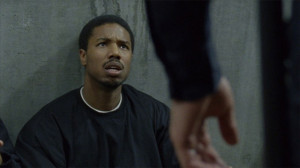Fruitvale Station will likely play to less-engaged audiences in the rest of the country than it will in the Bay Area, where Oscar Grant’s name is still invoked during any number of protests. The shooting death of the unarmed, 22-year-old Grant by BART police officer Johannes Mehserle in the wee hours of New Year’s Day, 2009, sparked protests that turned violent after multiple cell phone videos of the incident surfaced. Mehserle claimed he shot Grant by accident when the officer mistook his gun for a taser; he was convicted of involuntary manslaughter and spent a year in jail. That verdict sparked another angry protest and is still considered by some to be a miscarriage of justice.
The film, however, is not a polemic against Mehserle or the police. Mehserle’s name, in fact, is never mentioned on-screen, in the aftermath summary given at the end, or in the credits. Many viewers may even miss exactly which of the officers portrayed in the film did the shooting. The only clue as to who fired flashes by quickly, when an officer listed in the credits as”Caruso” (clearly meant to be Anthony Pirone, portrayed here as the primary provocateur, who in real life was fired by BART for escalating the confrontation) queries a young, confused-looking colleague: “What the f*** happened?” As to that officer’s motive in the shooting, the movie is agnostic.
Rather, Fruitvale Station, the first feature for writer/director and Oakland native Ryan Coogler, is a character study of a young man wrestling with his demons and the heavy burden of his past as he tries for a fresh start. With the exception of a flashback, the film takes place entirely on the last day of Grant’s life, but is economical enough in its storytelling to provide a compelling sense of the conflicting impulses that roiled him.
Michael B. Jordan, best known for roles in The Wire and Friday Night Lights, effectively imbues Grant with a restless, lost quality as he tries to cope with the narrowing choices left to him by his status as a young father, ex-con, and recently fired employee. Grant, as portrayed here, is clever but impulsive, a family man but also a player who has earned little trust from his girlfriend and still flirts with strangers. In one scene, he hits on a young white hipster buying fish at a grocery store, but ends up putting her on the phone with his grandmother, who advises her on frying techniques. The scene shows the sort of spontaneous, improvisational encounter created by a particular type of charismatic personality, the kind whose self-interest and altruism frequently bleed into one another, and whose poorly thought out choices can have terrible repercussions.




